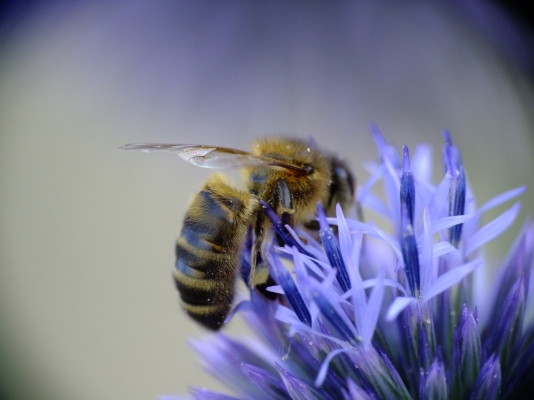Urban apiculture is growing in popularity in big cities like Montreal, Quebec City and Toronto, and not only among individual citizens. More and more organizations both large and small are turning to beekeeping, a positive and pleasant pastime. Many universities, schools, hospitals, hotels, commercial and government buildings have taken the plunge. A number of firms specialized in urban apiculture have emerged to assist individuals and organizations interested in becoming beekeepers.
The City as Oasis
It is now common knowledge that bee colonies all over the world are in dire straits. Every year 40% of US honeybee colonies die off, mainly due to environmental distress and the use of pesticides in agriculture. Pesticides have a direct effect on the nervous system of bees and contaminate hives, creating a devastating snowball effect on bee colonies. These pretty little creatures not only produce delicious honey but are important pollinators all over the planet, playing a crucial role in 40% of the food we eat! Bee hives in cities are far from farmland that contains pesticides harmful to bees. Thus the city is a veritable oasis for these industrious flying insects.
Simple and Accessible
Maintaining 2 hives calls for an annual budget of just under $5000. They will house a colony of some 50,000 bees, with each hive producing 22 pounds of honey. Most firms start with 2 hives, with some purchasing additional hives as time goes on.
Urban apiculture is not complicated, but it does require basic technical knowledge that cannot be feigned. It's best to consult a specialized firm. Most offer a turnkey package, educational services and bee awareness programs aimed at employees and clients, along with hive installation and regular maintenance, and harvesting and packaging the honey.
Bee hives don't require much space and 4 hives will fit into a 16 square-foot area, which is about the size of a pallet. Most are installed on the roofs of buildings. It’s important to choose a place of easy access, far from heat-generating equipment and near a water source.
Awareness and Education
Some people are afraid of bees, confusing them with wasps, which are more aggressive and invasive and what's more, do not pollinate flowers. Bees do not attack; they are workers. If the colony is not under threat, a bee will not attack another living creature. Hives do not pose a danger as long as a minimum distance is respected.
Embarking on a beekeeping project means educating, reassuring and mobilizing employees. Once basic education has been provided, urban apiculture will generate enthusiasm and collective provide within the organization.
Positive Impact
Some companies have opted to install beehives in full view of employees and visitors. These installations become intriguing educational sites that give the organization a very positive reputation. The honey that is produced is a source of pride, and can lead to creative branding when sold or distributed as corporate gifts.
According to Alexandre McLean, a co-founder of Alvéole apiculture urbaine, Montreal alone produced 30 tons of honey in 2016. Many companies that have set up beekeeping projects intend to pursue the adventure and even increase production. If the trend continues, urban apiculture will account for 15% of local production. Interested?

